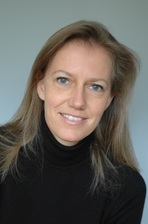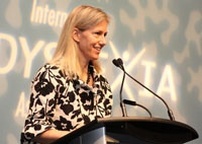|
By Gabrielle-Ann Torre When you walk into Dr. Guinevere Eden’s lab, the Center for the Study of Learning at Georgetown University, you sense warmth. Crayon drawings on the walls and stuffed animals on the couches welcome the lab’s major research participants: children. Dr. Eden, a professor in the Department of Pediatrics, is a forerunner in the field of dyslexia, participating in the first study to use fMRI to examine the neural basis of this disorder, and her lab investigates how we read and learn in development. With two children of her own, in addition to the “children” of the lab—grad students and research interns—Dr. Eden embodies a female role model in science. Keep reading for her insights on the importance of these role models and how she became one herself:
GT: You received your doctorate in physiology at Oxford. What was it like being a woman in science at that time, and how has it changed since? What hurdles or challenges have you faced—or seen others face—along the trajectory of a scientific career?
Dr. Eden: During my interview, I met with several PIs to see whose lab I might be able to enter for my Ph.D. One person I met with asked me who would look after the children when I’m a scientist, and I naively told him that a career in science might be quite good for raising children…not that I really knew what it was going to be like. That’s the type of question that hopefully no applicant would be asked these days. GT: Did you join that lab? Dr. Eden: No [laughs]. I actually joined a lab that had several other female scientists; although, in general, there were very few women in my department [physiology at Oxford]. What was really lacking [was] seeing female PIs. I didn’t see women scientists who made me think, “Wow, these women are impressive” until I came to America. That’s the reason I came to America—to do my post-doc training. It started because I had an opportunity to go to a lab in America, where all of a sudden, I was surrounded by women who were playing a much more prominent role in their research. GT: Did the environment at Oxford ever discourage you from obtaining a tenure-track position or running your own lab? Did you ever think that wouldn’t be feasible? Dr. Eden: I think I was worried as a Ph.D. student [about] how this was all going to work out…I did actually look at a job in the industry, but I decided to stay in science. For me, it was really important to go to America. I was so shocked when I went to a conference in America, and a woman got up—she was very articulate, she was very strong, she was very self-assured. She had a position. She had an opinion. I’d never heard that before. GT: Do you enjoy having more women in the lab? Is that something you want to build upon? Dr. Eden: I’m happy to have a lot of female scientists in the lab. Working as a scientist these days is not only about being a good scientist, but it’s also about working with other scientists, and that requires some good interpersonal skills and communication. I think women are really good at that. Collaboration is really important [in science], and women like to talk about ideas and concepts. I’m just happy to see so many more women in this field, like Society for Neuroscience—when I would go as a student, you would hardly see women. Now you see many young women. I find that very exciting! GT: In June, Dr. Tim Hunt made sexist remarks regarding women in labs. His statement reflects persistent hurdles for women in science. What’s your personal response to these statements? Dr. Eden: I think it’s about changing the culture. Somebody like Professor Hunt is older, and people have used this as a way to defend him. It doesn’t make it defensible, but I think you have to understand history, which is [that] he is deeply engrained in this British culture that is misogynist. I saw it when I was a student at Oxford. But to be successful in your work, you have to go with the times. I have to learn new computer programs. I have to learn about new software to do brain data analysis. I have to learn new techniques. And I can’t defend myself by saying, “Oh, I’m just going to stick with the old and still be a successful scientist.” People like him need to recognize that, in our working environment, you have to move away from certain things that you become used to and accept the new. Every day in American news, you see examples of women being treated as equals, whether we’re looking at the army or the presidential race. It’s changing everywhere, and if you’re going to make a valuable contribution, you need to drop some of your deeply engrained biases, move forward and recognize that it’s not appropriate to make statements like that. For somebody who is a Nobel Laureate, [Professor Hunt] will have had a lot of experience working with the press, and he should know better. What this shows is that he has an inability to learn, which in my view, makes him a bad scientist. GT: What measures can people take to promote women in science on a bigger-picture scale? Dr. Eden: I think several things can be done. Women, in particular teenagers, can be very fragile in deciding who they are, their identity—we can do more to let women know that [science] is something they can do. This is not a club that they’re not a part of, but this is a very attractive career for women. Let them know that they can identify with this. At the higher level, we can recognize and fight these biases we all have. Even women have a bias against other women, and that’s something we all need to overcome. Let’s be proactive. GT: What words of advice do you have for young aspiring female scientists? Dr. Eden: Reach out to people. Reach to scientists—especially to women scientists—and ask if you can visit their labs. That way, you’ll really learn about what your opportunities are and begin to network with people. Often, people think that they should somehow know what it is they should be doing, but the only way you’ll find out is by making connections. Women tend to be shy about this, and I’d encourage women to step out there into this world. That’s what really helped me. I wanted to go to a meeting in America on dyslexia—I did it by connecting to a group in North Carolina…and I wound up going back again and again and collecting my thesis data. You never know where those connections will lead you. Comments? Leave them below!
0 Comments
Leave a Reply. |
SPOTLIGHTSMeet our Scientista Spotlights -- current-day women in STEM and women from science history -- and find your role model! Read opinion editorials and history pieces to get additional inspiration.
WHAT'S NEWYOU MIGHT ALSO LIKE
WHAT'S HOTCONNECT WITH USARCHIVES
June 2018
|
The Scientista Foundation, Inc. All Rights Reserved © 2011-2021 | Based in NY | [email protected]
The Network for Pre-Professional Women in Science and Engineering
The Scientista Foundation is a registered 501(c)(3) -- Donate!
The Network for Pre-Professional Women in Science and Engineering
The Scientista Foundation is a registered 501(c)(3) -- Donate!











 RSS Feed
RSS Feed